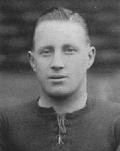

Lambert: John (Jack)
1922-1924
(Player Details)
Centre Forward
Born: Greasbrough, Nr Rotherham: 25-05-1902
Debut: v Leicester City (a): 08-09-1923
5’9” 12st 6lb (1928)
Lambert was a goal-scoring talent, that Leeds let slip through their fingers.
After playing Army football and for his native Greasbrough, he joined Methley
Perseverance and later had trials with Sheffield Wednesday. Leeds signed him
November 1922, but he was poached by Rotherham County and scored in his only game
for them. The League ordered him to return to Leeds and County were heavily fined.
In December 1924, though, after only one game for Leeds, he moved to Doncaster
Rovers, where he scored thirteen goals in forty-four games. Lambert had attracted
the attention of Herbert Chapman, when he was the Manager of Huddersfield Town,
and Chapman remembered Lambert when he needed a centre forward, and, in June 1926,
Arsenal paid £2,000 to sign him. Never guaranteed a regular place in the
star-studded Arsenal line-up, he made his debut in September 1926 but was an
understudy to Jimmy Brain for several years. He nevertheless scored ninety-eight
goals in one hundred and forty-three League games, including thirty-eight when
Arsenal won the League Championship in 1930-31, after he got his breakthrough and
was able to strike up a good understanding with Arsenal schemer Alex James. He
also scored eleven goals in sixteen F.A. Cup appearances, while at Highbury. He
scored one of the goals in their 1930 F.A. Cup Final win over Huddersfield Town
and also played in the 1932 Final, when Arsenal were beaten 2-1 by Newcastle
United. His feat of thirty-eight goals in thirty-four games in the 1930-31 season
was a club record which was later broken by Ted Drake, with forty-two goals in
forty-one games in the 1934-35 season, and the Lambert's tally included no less
than seven hat-tricks. He continued to score regularly for several seasons and
once scored five in one game, in a spectacular 9-2 demolition of Sheffield United
on Christmas Eve 1932, which again was an Arsenal record, but later bettered when
Ted Drake scored seven against Aston Villa on 14 December 1935. He added a second
First Division title to his record in 1932-33, when he scored fourteen goals in
twelve appearances. He has the third best strike rate of any Arsenal player. Time
caught up with Lambert and he was no longer first choice in the championship
season. Ernie Coleman, who Chapman had signed from from Grimsby Town for £7,500,
was the encumbent, and with the signing of Jimmy Dunne from Sheffield United for
£8,250 in September 1933, the writing was on the wall. He joined Fulham in
October 1933 for £2,500, where he scored four goals in thirty-four games, before
becoming Non-League Margate’s Player-Manager in the 1935-36 season. Margate were
officially the 'nursery' club for Arsenal and the use of several young and
promising Arsenal players, with the result that Margate swept all before them and
in that season the avearage age of the first team squad was only nineteen. The
'nursery' situation lasted for four seasons. In 1935-36 they won the Southern
League Central and Eastern Sections, the Kent Senior Cup, Kent Senior Shield and
Kent League Cup, in 1936-37 they won the Southern League Midweek Section, Kent
Senior Cup and Kent Senior Shield, and even in 1938-39, the final season of the
arrangement, they won the Kent League. Just before the war he returned to Arsenal
as a coach, but on 17th December 1940, aged thirty-eight, he died in Enfield,
North London as a result of injuries sustained in a road accident.